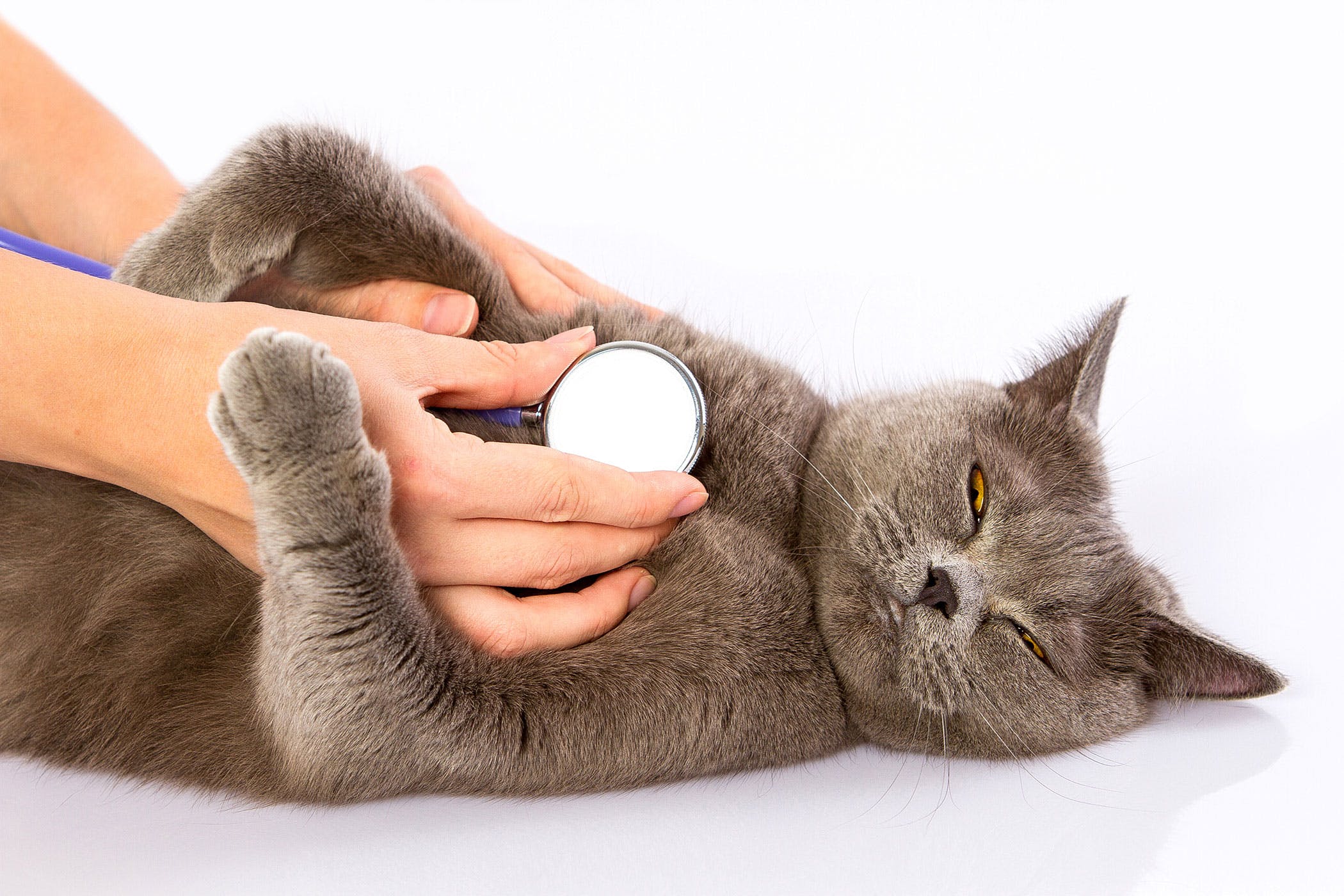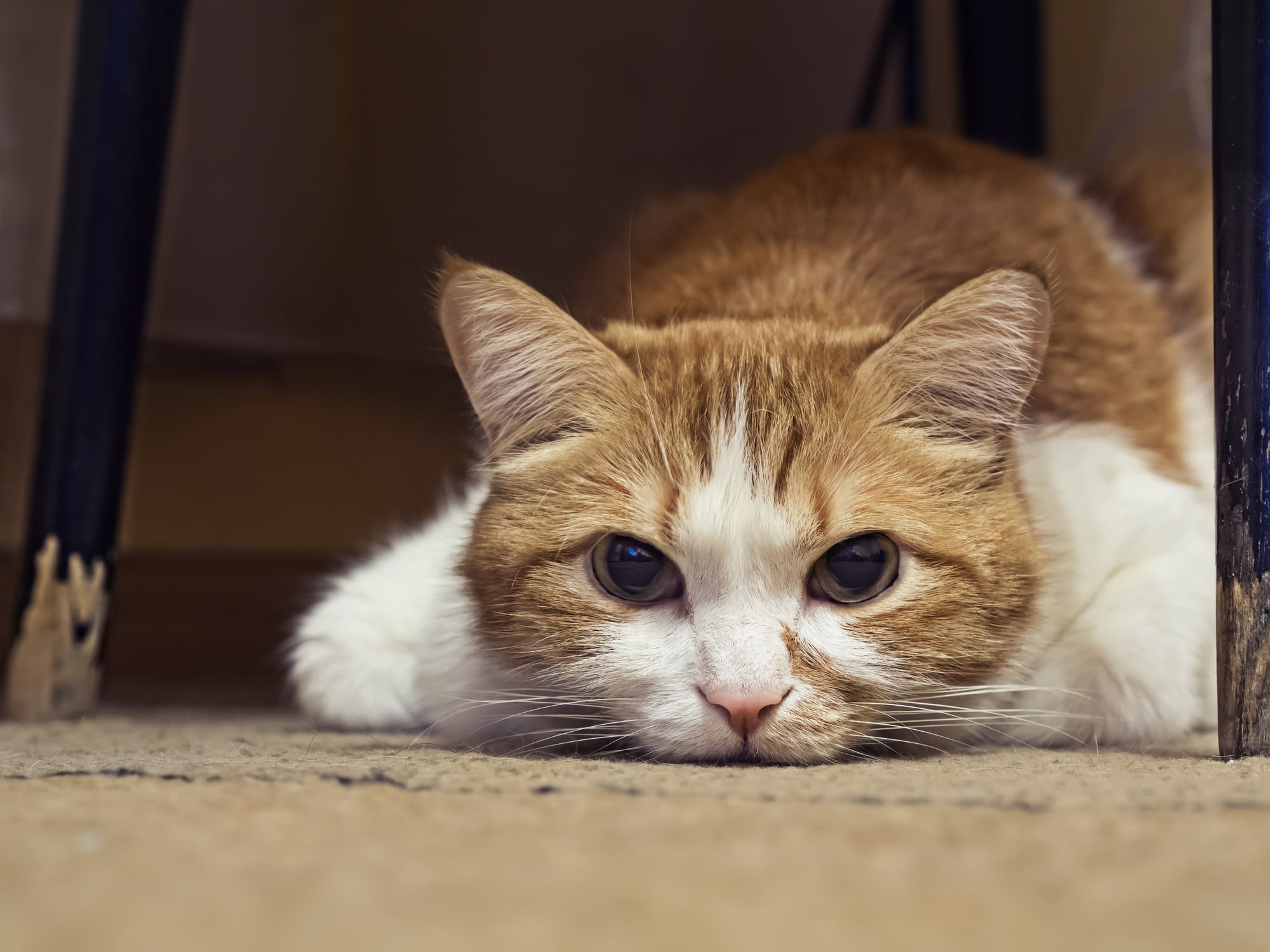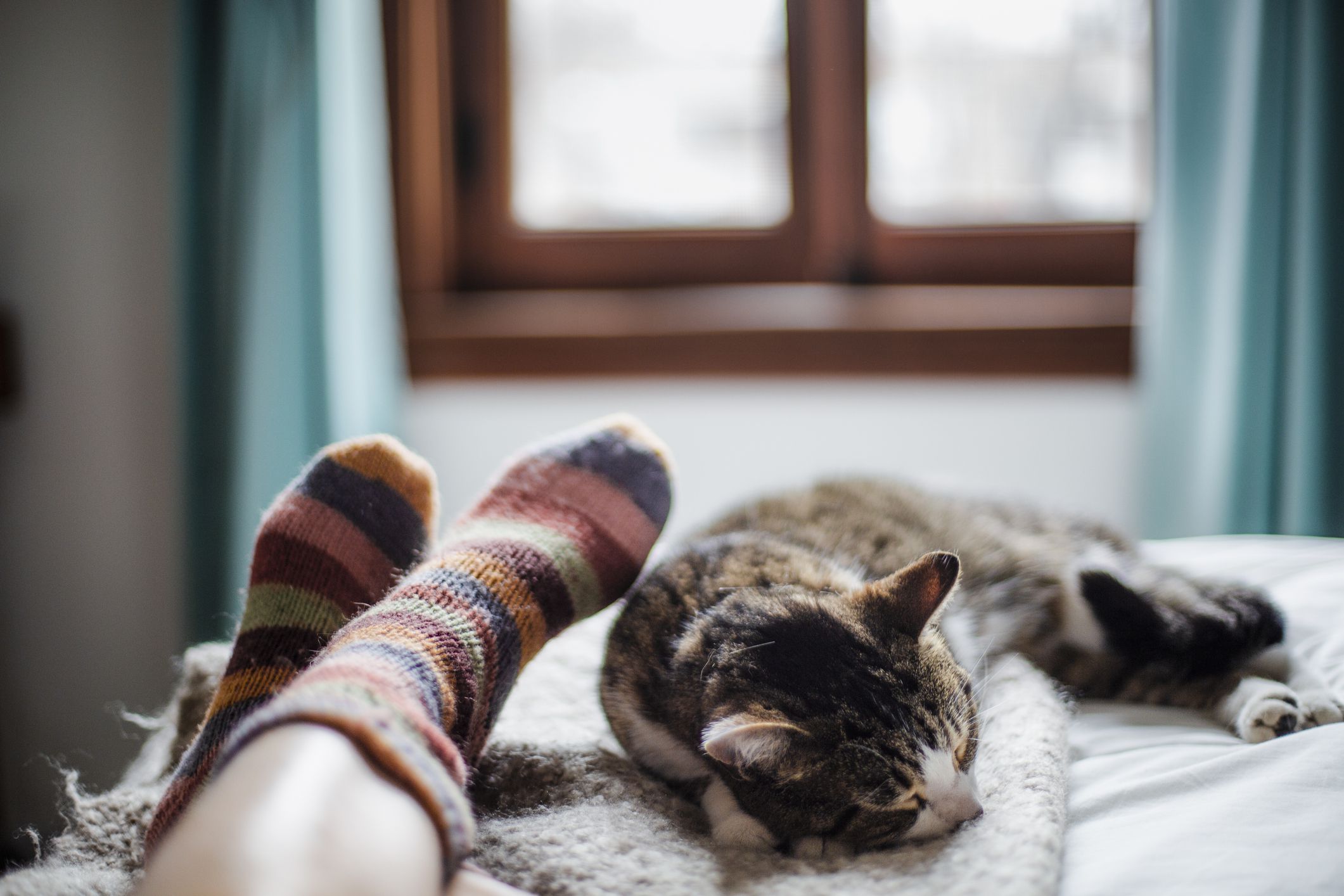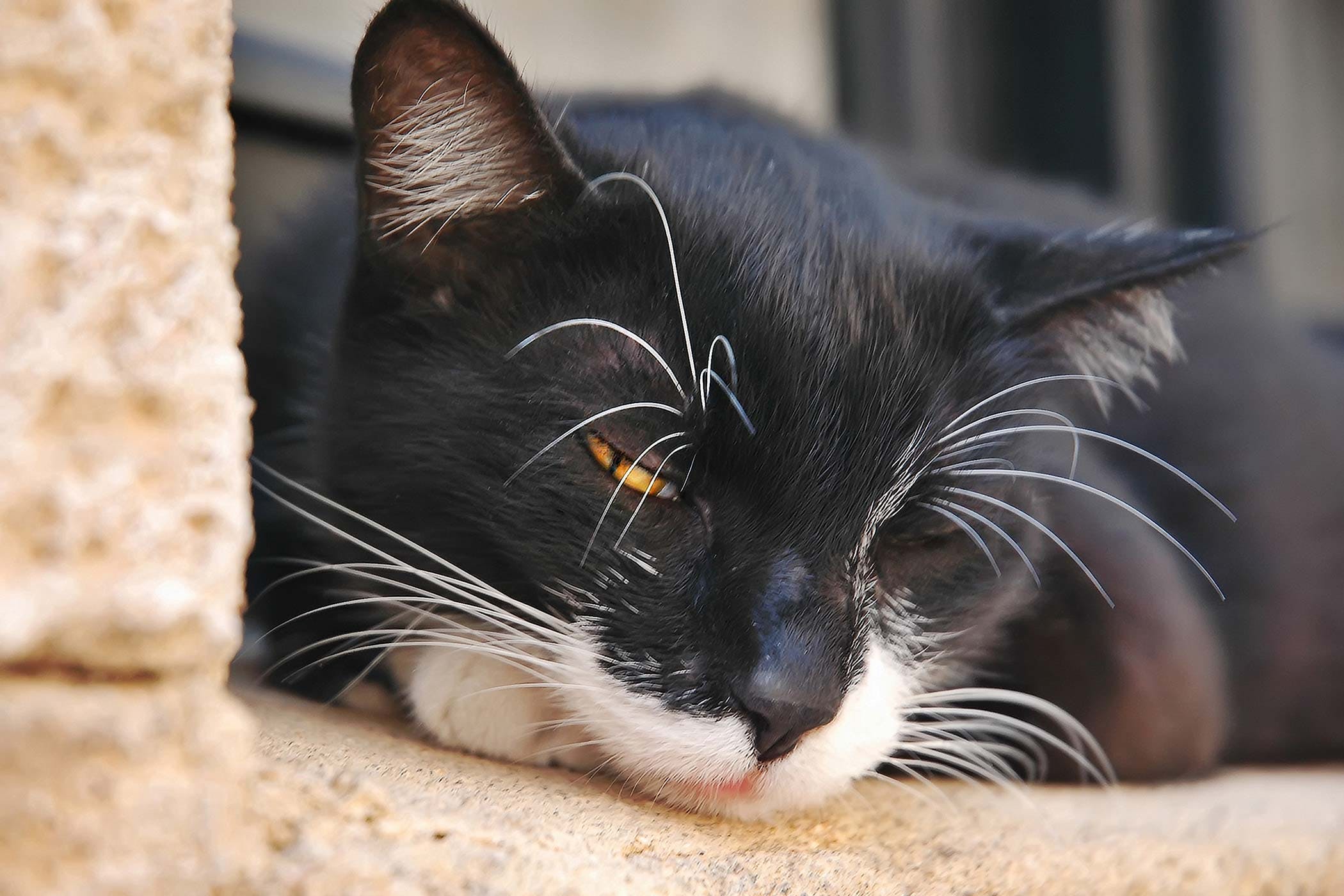
Cats have a bad habit of enduring pain without complaining at all, unless it is truly excruciating and they cannot continue with their daily routine. For this reason, sometimes it is very difficult to know how they feel, or if they have abdominal pain.
To help you, I'm going to tell you how you can suspect or intuit that your friend feels discomfort in his abdomen.
Causes of abdominal pain in cats

Portrait of yellow sad sick cat lying at home
Why can furry people have this type of pain? For many reasons:
- Have ingested a toxic sustance, or something they shouldn't (like paper, for example).
- Have eaten a spoiled food.
- Too many hairs have been swallowed, to the point that they have formed hair balls.
- they have Colic.
- Have become infected with intestinal parasites.
How do you know if they are sick?
Although it is difficult to know, there are several details that should make us suspicious, which are:
- The animal is listless, sad. You can stay in your bed all day.
- Lose your appetite. As much as we insist, each time we see that he eats less.
- Lose weight. By not eating, weight loss is inevitable.
- You have nausea and / or vomiting, especially if you have eaten something, even very little. He tries to expel what makes him feel bad.
- You have Diarrhea, to the point that wherever it sits, it stains.
If he has any of these symptoms, it is very important that you take him to the vet.
Transmission
Treatment will depend on the cause, for example:
- If you have ingested toxic substances, it may be necessary to give 1 gram of activated carbon for every half kilo of weight. But in no case should he be made to vomit if he has ingested any corrosive substance, such as bleach.
- If you have eaten a spoiled food, it may be enough to give him a bland diet (with chicken broth, boneless) 3 to 5 days.
- If you have hairballs, you can smear your leg with a little petroleum jelly, butter, or malt, which will not take long to lick. By doing so, you will be able to eject the balls.
- If you have colic, administer antispasmodics.
- If you have intestinal parasites, you will be given a antiparasitic pipette, or you will be given a pill to remove them.
Diagnosis of painful abdomen in cats
To diagnose your cat's condition, the vet will want a complete medical history and will also perform a physical exam that can lead to further diagnostic tests. What you provide to the vet can go a long way toward narrowing down the possible causes.. Knowing if there have been any reactions to a specific type of food, exposure to dangerous substances or circumstances, and all the other symptoms that your cat has shown can help in this process.
If the vet has determined that further tests are required, there are some common ones that will be performed. Common diagnostic tests include a complete blood count, a urinalysis, and a biochemical profile. All three tests are generally used to check for signs of inflammation or infection, and to examine how well the organs are working.
A fecal test may also be done if parasites are suspected. The vet may also perform a biopsy or even a peritoneal fluid analysis, which checks the type of fluid in your cat's abdomen if fluid is detected. Lastly, an x-ray or ultrasound of the abdomen will be taken. These scans can uncover any inflammation, tumors, kidney stones, or ruptures in the organs.
More treatment options
Since there are a variety of causes for abdominal pain, treatment plans can vary. Next we are going to tell you about some more detailed treatment options but taking into account what is explained in the previous point about treatments.
Surgery
If cancer or tumors have been found, the vet will almost certainly recommend surgery to remove it. A surgical procedure is also sought in the case of a ruptured bladder.
Medication
In the case of a parasitic infestation or a bacterial infection, your vet will prescribe a round of dewormers or antibiotics. Although these drugs may pose risks (such as side effects, development of resistance), the benefits generally outweigh those concerns.
It is important that they are administered as prescribed so that your cat gets all the benefits. Some medications can be given as supportive care. If your cat is in significant distress, your vet may recommend the use of pain relievers for relief.
Anti-nausea medications can be given to help stop vomiting and, in the event of seizures (mainly from poisoning), your cat can be given anti-seizure medications. What's more, medications that suppress the immune system may be prescribed.
Poison treatment
When poisoning is the cause of your cat's suffering, the vet will start treatment immediately after knowing which toxin was ingested, if possible. If your cat recently swallowed the poison, her stomach will be emptied and activated charcoal or fluid therapy may be given to help curb the ill effects. Additional treatment methods may vary depending on the specific toxin. For example, in rat poisoning, the vet may administer vitamin K.

Diet
In the case of dietary complications, a change in diet tends to be the recommended treatment plan. The vet may recommend a hypoallergenic diet or even an elimination diet. Both can help and determine if your cat is allergic.
Supportive care
Beyond pain and anti-nausea medications, supportive care may include administration of fluids to treat dehydration. What's more, if your cat is unfortunate enough to be affected, supportive care may be the main form of treatment, since viral infection has a high mortality rate.
Recovery of painful abdomen in cats

It is important to follow the treatment plan established by your vet, especially if you have been prescribed medication. The prognosis will vary with the cause of the abdominal pain. Relapse can occur for some conditions, and some can be chronic. Monitor your cat's appetite and any other symptoms. If they do return, be sure to take your cat to see the vet.
The moment you discover that your cat may have abdominal pain, it is important that you do not let it pass. Do not allow it to be with that suffering because it may not be a temporary or fleeting pain ... It is better to discover the underlying causes that cause it and that way the appropriate treatment is found as quickly as possible.
We must be very aware of any changes that occur in the routine of our furry animals, to be able to treat them as soon as possible.
